Accelerate Productivity in 2025
Reignite Growth Despite the Global Slowdown
Digital technologies connect people, information, and urban elements to enable smart cities to function as a cohesive system that enhances quality of life. Given the climate emergency, urban solutions prioritize sustainability alongside intelligence. Tech-driven innovations optimize energy consumption across applications ranging from mobility and urban planning to waste management. In the post-COVID world, startups are offering novel approaches to healthcare, education, and citizen protection. This citizen-oriented approach to city management fosters community collaboration, inclusivity, and creativity, addressing both current and future urban needs.
This article was last updated in August 2024.
Innovation Map outlines the Top 10 Smart City Trends & 20 Promising Startups
For this in-depth research on the top global decarbonization trends and startups, we analyzed a sample of 3298 global startups & scaleups. This data-driven research provides innovation intelligence that helps you improve strategic decision-making by giving you an overview of emerging technologies and trends in the smart city industry. In the Smart City Innovation Map, you get a comprehensive overview of the innovation trends & startups that impact your company.
Top 10 Smart City Trends (2025)
- Smart Mobility
- Digital Citizen
- Public Safety & Security
- Smart Energy
- E-governance
- Green Urban Planning
- Advanced Waste Management
- Smart Building
- Advanced Water Management
- Intelligent Farming
Want to explore all smart city innovations & trends?
These insights are derived by working with our Big Data & Artificial Intelligence-powered StartUs Insights Discovery Platform, covering 4.7M+ startups & scaleups globally. As the world’s largest resource for data on emerging companies, the SaaS platform enables you to identify relevant technologies and industry trends quickly & exhaustively.
Tree Map reveals the Impact of the Top 10 Smart City Trends
Based on the Smart City Innovation Map, the Tree Map below illustrates the impact of the Top 10 Smart City Trends in 2025. The Internet of Things (IoT), AI, cloud computing, and data analytics support sustainable modifications in smart city components. The most prevalent trend is smart mobility which ranges from intelligent traffic management and zero-emission transportation to autonomous vehicles and car-sharing programs.
Tech solutions for digital citizens are another important direction that consists of remote healthcare, interactive education, and entertainment. Startups also undertake measures to ensure people’s safety and security using blockchain. Lastly, developments in robotics, extended reality, and drones empower urban planning, farming, and waste disposal.
Global Startup Heat Map covers 3298 Smart City Startups & Scaleups
The Global Startup Heat Map below highlights the global distribution of the 3298 exemplary startups & scaleups that we analyzed for this research. Created through the StartUs Insights Discovery Platform, the Heat Map reveals that Western Europe is home to most of these companies while we also observe increased activity in the United States and India.
Below, you get to meet 20 out of these 3298 promising startups & scaleups as well as the solutions they develop. These 20 startups are hand-picked based on criteria such as founding year, location, funding raised, and more. Depending on your specific needs, your top picks might look entirely different.
Top 10 Smart City Trends & Innovations in 2025
1. Smart Mobility
Smart mobility leverages technology to enable people and various forms of transport to function in more efficient, resilient, and sustainable ways. Infrastructure improvements, mobility-as-a-service, micromobility, and logistics solutions are advancing urban mobility. Zero-emission transportation, supported by charging infrastructure, plays a pivotal role in this evolution.
Intelligent traffic management and advanced commuting options also contribute to eco-friendly urban mobility. Autonomous vehicles, hyperloops, robotaxis, and water taxis are innovative transport options in smart cities. These developments underscore the transformative power of smart mobility.
Urban SDK simplifies Transportation Planning
US-based startup Urban SDK develops a transportation planning tool for smart cities. The startup deploys real-time location analytics to facilitate an efficient, safe, and sustainable mobility future. Also, its business intelligence platform utilizes quantum data modeling and cloud computing for fast geographic information system (GIS) data visualization, analysis, and prediction. This allows city planners to make better-informed budgeting decisions and manage data collaboratively, ensuring that the policy-making decisions involve all stakeholders.
BluSmart simplifies Electric Mobility Sharing
BluSmart is an Indian startup that provides an eco-conscious electric cab-sharing app. The operational model prioritizes punctuality evidenced by on-time pickup and the absence of a cancellation feature for drivers underscores reliability. Central to BluSmart’s ethos is environmental responsibility, with the company reporting a reduction of 14500+ tonnes in CO2 emissions.
To date, the service has facilitated over 6.5 million environmentally-friendly rides, accumulating more than 225 million clean kilometers. Transparent fare structures eliminate unpredictable surge pricing, and the company offers both point-to-point and hourly rental options at competitive rates.
2. Digital Citizen
The digital citizen trend focuses on increasing citizen engagement, collaborative community, and access to healthcare and education. It prioritizes digital inclusivity, ensuring technology access across diverse populations. Inclusive services provide equal rights to civic participation and career opportunities. For instance, local connection platforms include online voting and remote interaction with the officials.
In the education sphere, remote and personalized learning contributes to the broadening access to education globally. AI-powered healthcare ecosystems also provide early prediction and prevention measures, emphasizing support for the elderly.
eAgora simplifies Citizen-City Administration Collaboration
eAgora is a Spanish startup that provides a unified digital citizenship platform for municipalities. The startup’s app features various solutions for connecting citizens, informing the public, managing road incidents, or collecting e-waste.
With eAgora, citizens impact budget distribution, share ideas, launch initiatives, and publish events. Moreover, the startup integrates gamified modules of points and enables badge trading for real-life awards, such as a discount at a local trade, to reinforce public participation.
Waymap offers Inclusive Navigation Guidance
UK-based startup Waymap makes navigation in cities inclusive and broadly accessible. The startup’s app offers precise guidance for both indoor and outdoor navigation using in-depth orientation and mobility surveys. The combination of sensor technologies and a community-based approach to urban framing offers maps up to 1m accuracy for pedestrians without any external signals.
3. Public Safety & Security
Digitalization enhances public safety and security, enabling efficient crime combat and emergency handling. Critical city solutions, such as surveillance systems, smart streetlights, real-time crime mapping, and predictive policing, leverage big data and AI.
These strategies optimize road traffic, anticipate incidents, and prevent fires. Further, drone technology aids in aerial monitoring, supplementing ground-level operations during emergencies. As smart cities interconnect, cybersecurity and digital ethics become increasingly important.
MarshallAI offers Real-Time Video Analytics
MarshallAI is a Dutch startup that provides an advanced machine vision solution for enhancing public safety and security in cities. The company’s technology processes real-time video feeds from existing surveillance cameras to automatically detect objects, incidents, and abnormal behaviors. This system identifies safety incidents such as fights, vandalism, and hazardous objects, and sends immediate alerts to relevant authorities. The solution’s key benefits include increased situational awareness, reduced response times, and enhanced security.
Brinc Drones makes First Response Drones
Brinc Drones is a US-based startup that develops innovative first response drone solutions for critical situations such as fire, defense, and search & rescue, among others. The LEMUR 2 drone features a glass breaker, effective on tempered, automotive, and most residential glass types. This functionality enables the drone to access structures swiftly. The attachment proves instrumental in ventilating buildings during fires, facilitating entry in active shooter scenarios, and aiding in life-saving operations. Additionally, the BRINC Ball, another product, produces a sound audible from up to 100 feet away. Its volume compares to that of a lawn mower when positioned a foot and a half distant.
4. Smart Energy
Smart cities prioritize reliable, efficient, and eco-friendly energy supply. Interconnected IoT solutions enhance energy management by delivering data-backed decisions for better energy storage and distribution. Smart grids provide real-time tracking, while deep learning solutions forecast energy consumption and potential system breakdowns.
Additionally, virtual power plants (VPPs) are powerful means to efficiently distribute energy. To further aid the clean energy transition, new renewable energy practices transform organic waste into biogas using bacteria. Lastly, data analytics and machine learning ensure the reliability and efficiency of energy infrastructure through predictive maintenance.
Intellico optimizes Energy Production & Consumption
Intellico, an Italian startup, revolutionizes energy management by optimizing production and consumption through advanced technology. Its dynamic platform harnesses and structures energy data from diverse sources, empowering users with real-time insights into energy consumption and cost efficiency. By modeling asset energy behavior, Intellico visualizes current energy usage and quantifies potential savings grounded in historical analysis.
Centralizing energy analysis, the startup enhances the efficiency of visualization and performance assessment. It lowers energy consumption, accelerates the discovery of saving opportunities, and reduces maintenance costs, thereby enabling intelligent energy management.
Qube manufactures Smart Energy Meters
Indian startup Qube offers solutions for monitoring and managing energy consumption. Using the startup’s smart meter, users are able to forecast their monthly bills based on real-time data. The platform allows real-time power and energy tracking from any location and on any device. Additionally, users have the capability to remotely control their meters, including switching them on or off.
The system provides detailed analytics on daily energy usage patterns. Alerts are generated for sudden spikes in energy consumption. Furthermore, the startup’s platform supports both prepaid and postpaid options on a single meter and facilitates sharing of meter readings.
5. E-governance
E-governance in smart cities drives open, sustainable, and collaborative public services and decisions. Blockchain and IoT-based solutions include all stakeholders in decision-making. Online voting, digital passports, and robust data security tools expand e-democracy and encourage citizen participation.
Online retraining programs and local e-career centers contribute to economic growth. Business functions like licensing and tax filling are digitalized. E-governance adoption fosters a connected, empowered citizenry by improving transparency, efficiency, and accessibility in public administration.
Kleros offers a Dispute Resolution Platform
Kleros is a French startup that provides a blockchain-based solution for decentralized third-party dispute resolution. Its crypto-based mechanism, built on Ethereum, functions as an online arbitrator to resolve gray-area disputes in legal claims, finance, and e-commerce, among others. Kleros’ smart contracts thus bring fast, reliable, and transparent digital methods to the traditional legal system.
Polyteia provides an End-to-end Governance Solution
German startup Polyteia provides an e-governance platform for the public sector that allows city leaders to integrate, share, and utilize data to improve decision-making. The cloud-based platform unifies and merges data from various systems to empower state, federal, and local municipal bodies. Its analytics tools derive insights from demographic changes to forecast daycare capacities and personnel shortages, allowing city authorities to better plan future operations.
Find out how 10 emerging technologies shape your industry!
6. Green Urban Planning
Due to climate change, urban planning is facing a significant challenge to make cities smart, sustainable, and resilient. Decarbonization goals drive the design of green urban spaces, with sustainable neighborhoods and 15-minute city models. Green spaces, parks, and community gardens enhance biodiversity and air quality.
Innovative architecture uses green building materials and energy-efficient designs, reducing urban carbon footprints. Water conservation techniques, including rainwater harvesting and efficient wastewater management, are also crucial. Rising sea levels spur sustainable alternatives like floating cities, islands, farms, schools, and riverbanks.
Airmine provides Air Pollution Forecasts
Norwegian startup Airmine utilizes data from IoT sensors to predict air quality and local pollen distribution. Air quality sensors obtain measurements of PM 2.5, both indoor and outdoor, for smart window control and indoor climate management.
For pollen forecasts, the startup processes the data from the satellite images using machine learning algorithms to display maps with trees and grass that cause allergies. Smart cities utilize Airmine’s solution to efficiently analyze local air pollution and pollen data to make suitable decisions in urban planning.
TreeSense enables Plant Health Monitoring
TreeSense is a German startup that uses AI to monitor the health of trees. The company develops a platform that collects data from sensors attached to the trees and analyzes it using machine learning algorithms. The platform provides insights into the trees’ growth, stress, water use, and carbon sequestration.
The startup also offers a mobile app that allows users to access the data and interact with the trees. It assists forest managers, farmers, researchers, and environmentalists in improving their decision-making and conserving natural resources. TreeSense thus reduces deforestation, enhances biodiversity, and mitigates climate change.
7. Advanced Waste Management
Urban populations and consumer culture growth lead to increased waste production. IoT sensors in advanced waste management systems accurately monitor waste disposal, providing consumption feedback and monetary rewards to residents. At the same time, e-waste recycling kiosks allow people to exchange electronics for money.
Intelligent bins sort trash and regulate garbage volume. AI recycling robots precisely identify the type of materials during waste separation, which increases overall productivity by avoiding human involvement. Further, composting initiatives transform organic waste into soil amendments, reducing landfill reliance. These solutions collectively mitigate the environmental impact of economic activities.
Candam provides a Waste Disposal Rewarding System
Spanish startup Candam develops IoT technology for urban waste management. The startup’s patented technology, RecySmart, installable in any waste bin, transforms them into smart bins. The citizens identify themselves via an app or RFID card, initiating the recycling process.
The system characterizes packaging materials in real time, using acoustic techniques and AI algorithms. It provides recycling points or cash refunds as incentives, thereby increasing packaging recovery rates and improving waste management efficiency.
Banqloop offers an AI Smart Trash Platform
Banqloop is a US-based startup that develops an AI-driven cloud-based ecosystem for waste recycling. It organizes waste, breaks it down, and sends it directly to the manufacturers for reuse. The startup’s waste bins use patented auto-sorting technology that analyzes images, inspects barcodes, and separates waste using a spectrometer. Besides, Banqloop’s platform integrates the data like time of discard, type of waste, and geolocation to transform supply chain logistics and manufacturing into agile processes.
8. Smart Building
In the face of climate change and the COVID-19 pandemic, the construction industry is creating flexible workspaces, leveraging remote management technologies, and implementing automated building controls. The advent of digital twins, smart sensors, and cloud computing facilitates real-time monitoring, predicting energy usage, detecting security risks, and optimizing expenses.
Interactive kiosks have become a common sight, offering a range of services from navigation information to Wi-Fi access, and even public safety alerts. The use of intelligent materials guided by data analytics, senses changes on surfaces and responds accordingly. High-tech materials like graphene are being used to enhance the structural health of buildings.
Sapient Industries develops a Plug Load Management System
Sapient Industries is a US-based startup that applies smart socket devices to identify unused equipment. The embedded sensors in the plug load management system cover plugged-in assets in the whole building, collecting vital information to track energy costs. On top of that, the startup uses machine learning (ML) algorithms to optimize energy consumption, reduce utility bills, and minimize the wasted plug load.
Solarix designs Solar Facade Panels
Solarix is a Dutch startup that offers solar facade panels to make buildings energy-neutral. The startup’s proprietary technique prints solar cells on ceramic tiles considering its transparency and texture, so the panels are sustainable, efficient, and aesthetically pleasing. Solarix’s energy-generating facades allow buildings to save energy and accelerate decarbonization.
9. Advanced Water Management
Global warming triggers a pressing need for superior water management systems. Smart tools and devices in wireless metering provide citizens with hourly statistics on water consumption to increase awareness and reduce costs. Cloud computing, sensors, and user-focused methods are employed by intelligent control systems to minimize water wastage in buildings.
In addition, real-time water quality control identifies potential leaks, enabling early issue prevention. Water restoration measures encompass saltwater desalination and stormwater collection materials. Structural floating technology dynamically adjusts to water level fluctuations, promoting aquatic diversity within riverbanks. Moreover, AI-driven systems forecast water demand and supply, facilitating effective water allocation and conservation strategies.
Orca-tech develops Water Surface Cleaning Boats
Chinese startup Orca-tech manufactures self-driving boats for automated cleaning of water surfaces. Combining robotics and AI, the startup produces intelligent sanitation equipment. Its multifunctional robots accumulate information on water quality for unmanned real-time cleaning of floating garbage. Orca-tech’s self-driving boats also feature a wireless modular charging device, which decreases operational expenditure and occupational risks.
Droople builds an Internet of Water Platform
Droople is a Swiss startup that provides IoT-based smart solutions to monitor water quality and promote its conservation. The startup’s platform, Water Intelligence Platform, tracks the real-time health status of connected assets and, in turn, predicts their lifespan.
Droople also adds smart motion sensors, iLink, to measure the flow and temperature of inline pipes. The cloud platform stores data and further analyzes it for alarm notification, consumption reduction, and behavioral pattern modeling, improving water management.
10. Intelligent Farming
Innovations in IoT, robotics, and data analytics are revolutionizing farm management and labor optimization. Wireless sensing applications are now employed by farmers to monitor soil conditions and livestock health, thus curtailing the spread of diseases. Urban agtech is integrating vertical indoor farming, aeroponic containers, and urban aquaponics for automated food production.
Smart greenhouses, for instance, utilize agrivoltaics with vertically-embedded bifacial solar cells for electricity generation. Furthermore, smart nanomaterials are emerging as protective layers to enhance food safety and reduce wastage. AI-driven systems are stepping in to analyze data, fine-tuning lighting, nutrient delivery, and climate control. This ensures the production of high-yield and quality produce.
Fish n’ Greens offers Aquaponics
Portuguese startup Fish n’ Greens delivers healthy, fresh, and locally-grown food for citizens. The startup applies aquaponics to synergize fish farming and plant growing in one place. This method facilitates water-saving, reduces maintenance costs, and improves food safety.
Using solar energy, the startup’s smart modular technology produces food in a limited space without harming the environment. By filtering solid waste into a liquid fertilizer, the system retains the fine sediments in soil and also reduces carbon emissions.
Gathera develops Indoor Smart Gardens
Australian startup Gathera provides easy-to-use hydroponic gardens equipped with LED lights to grow food indoors. The startup’s specially designed smart kits enable people to grow different types of herbs within a small space, reducing maintenance efforts. It also supplies indoor gardens with smart soil that absorbs water significantly faster and keeps plants moisturized for longer. The startup’s method resolves food waste and reduces food miles.
Discover all Smart City Trends, Technologies & Startups
The long-term effects of COVID-19 and the ecological crisis shed light on what smart cities should concern about. Making cities habitable, resilient, and designed with a strong sense of community is one of the top priorities for emerging startups and scaleups. The top 10 Smart City Trends bring changes in transportation, utility management, space planning, mass participation, and data protection. These solutions are committed to building a connected and intelligent ecosystem that nourishes human and environmental needs.
The Smart City Trends & Startups outlined in this report only scratch the surface of trends that we identified during our data-driven innovation and startup scouting process. Among others, connected mobility, climate technologies, and natural resource management will transform the sector as we know it today. Identifying new opportunities and emerging technologies to implement into your business goes a long way in gaining a competitive advantage. Get in touch to easily and exhaustively scout startups, technologies & trends that matter to you!
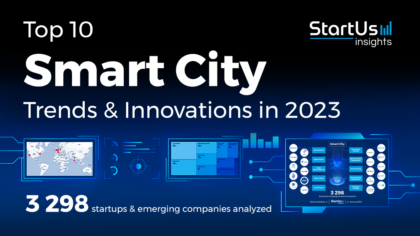

 WATCH THE VIDEO VERSION
WATCH THE VIDEO VERSION 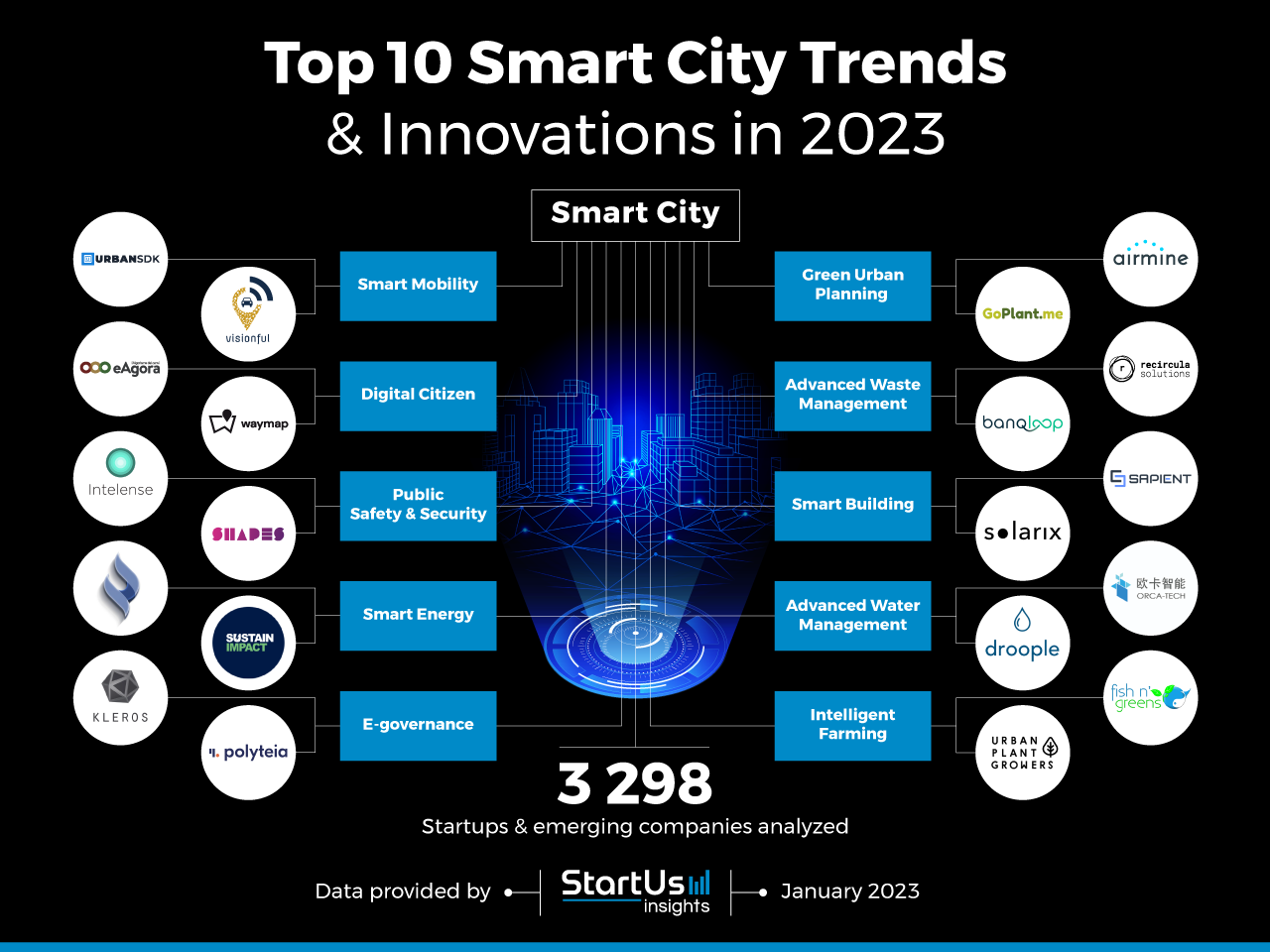
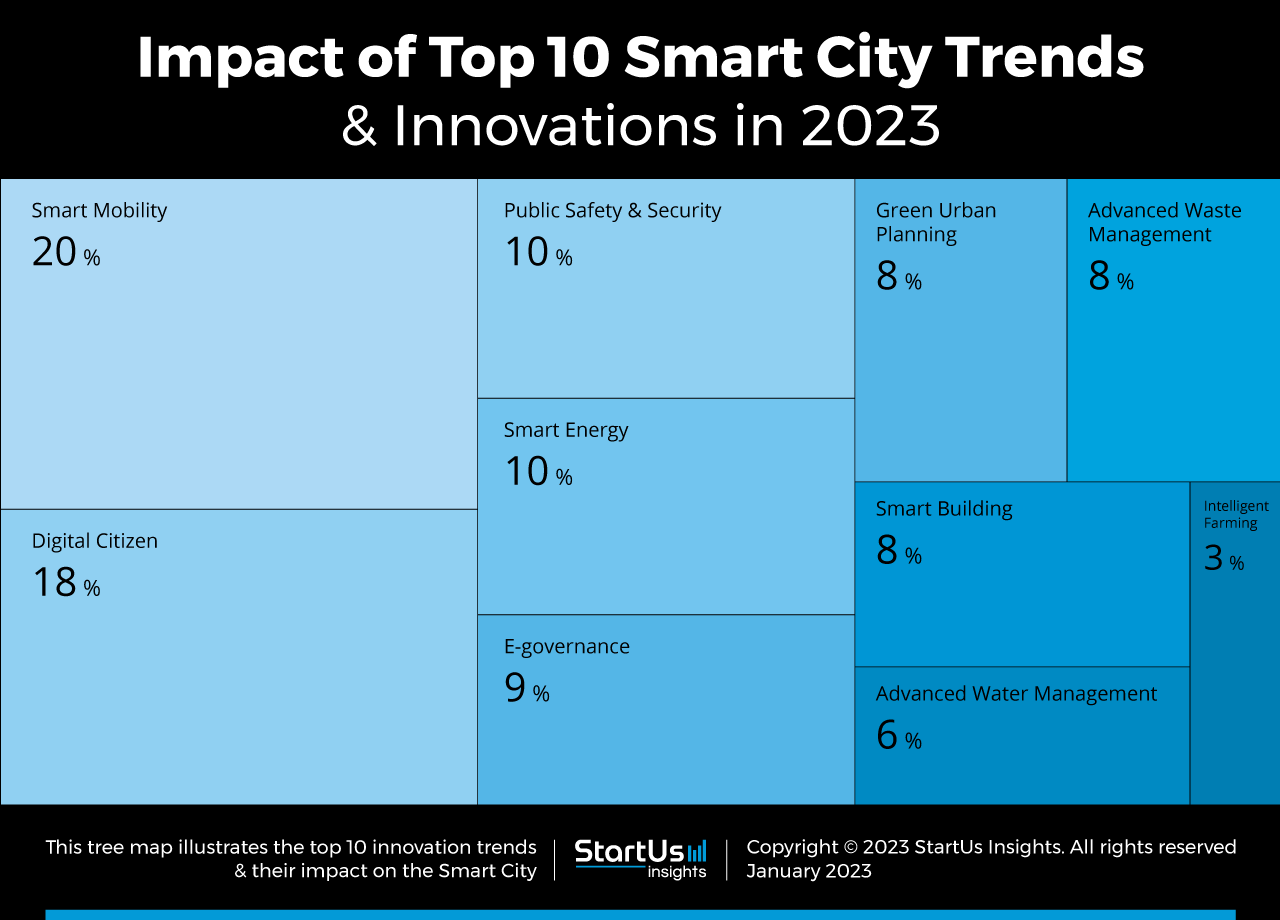
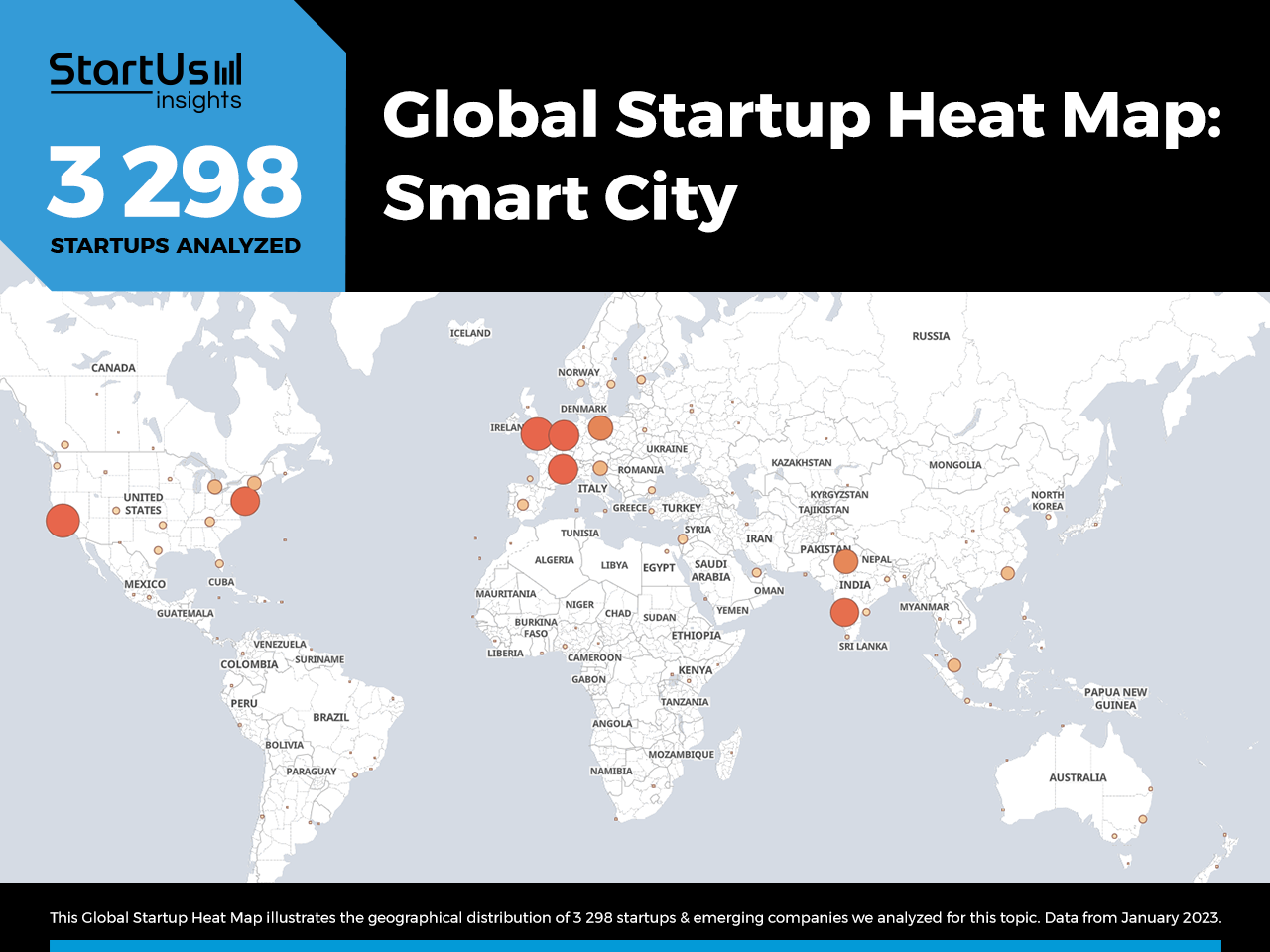

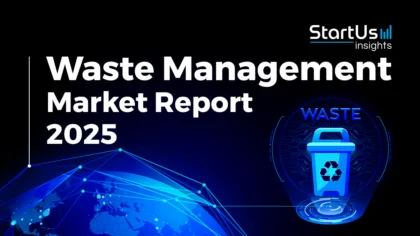
![Explore the 10 Emerging Smart City Trends [2025-2030]](https://www.startus-insights.com/wp-content/uploads/2025/06/Smart-City-Trends-SharedImg-StartUs-Insights-noresize-420x236.webp)




